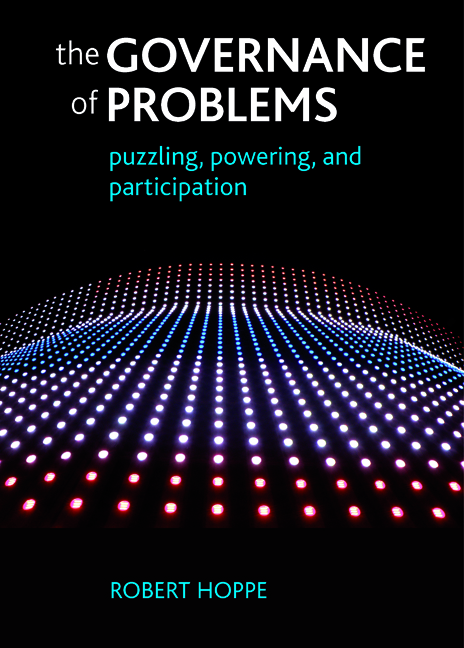Book contents
- Frontmatter
- Dedication
- Contents
- List of boxes, figures and tables
- About the author
- Preface
- one A problem-processing perspective on governance
- two The governance of problems: a map
- three Analysing policy problems: a problem-structuring approach
- four Cultures of public policy problems
- five Problem types and types of policy politics
- six Problem-structuring dynamics and meta-governance
- seven Making policy analysis doable and reflexive
- eight The plural democracies of problems: a meta-theory
- nine Public engagement and deliberative designs
- ten Responsible and hopeful governance of problems
- Bibliography
- Index
eight - The plural democracies of problems: a meta-theory
Published online by Cambridge University Press: 01 September 2022
- Frontmatter
- Dedication
- Contents
- List of boxes, figures and tables
- About the author
- Preface
- one A problem-processing perspective on governance
- two The governance of problems: a map
- three Analysing policy problems: a problem-structuring approach
- four Cultures of public policy problems
- five Problem types and types of policy politics
- six Problem-structuring dynamics and meta-governance
- seven Making policy analysis doable and reflexive
- eight The plural democracies of problems: a meta-theory
- nine Public engagement and deliberative designs
- ten Responsible and hopeful governance of problems
- Bibliography
- Index
Summary
The differentiation of the political … follows from the fact that more and more modes of representation, types of supervision, procedures of monitoring, and manners of expression of preferences are becoming available…. (Rosanvallon, 2006: 221)
Introduction
Previous chapters have approached problem structuring in a policy- or programme-centred way. In the next two chapters, the focus is broadened to a polity-centred approach (Skocpol, 1992). If there are different types of public problems, the normative implication seems to be that political regimes should be able to equally well handle all four policy problem types. However, are polities robust against all problem types?
Representative and aggregative democracy frequently appears wedded to the metaphysics of a unified political will of ‘we-the-people’, to be uniformly imposed on a ‘generalised’ citizen. Therefore, democratic systems are adept in handling routine issues of large-scale interest articulation and negotiation, and issues that can be handed over for standardised treatment to professional groups, specialists and the legal system. But they look less well equipped to deal with the intractable controversies that frequently emerge around ethically divisive issues and ‘wicked’, or unstructured, problems (Schön and Rein, 1994; Hoppe, 2008a). The ‘particularised’ men in contemporary emancipated civil society need more appropriate, innovative institutional and process designs for more deliberative and integrative elements in democracy. The key is to unlearn to conceive of democracy in a singular way, and to learn to see it in a pluralist way.
Day-to-day practice of democracy requires different modes of democratic governance to successfully deal with different structures of problems. This argument will unfold in this chapter in several steps. The first section stresses and elaborates the findings of Chapter Six: policy change frequently comprises both substantive frame shifts and instrument choice, and shifts in governance, that is, shifts in network type. However, state-centred public administration, or managerialist theories of network management and procedural policy instrument choice, have the Machiavellistic shade of a central, not-so-rational-rule approach. Instead, the governance of problems will be discussed here from the perspective of democratic legitimacy. Democracy is not a troublesome normative add-on, but the core of practical thinking about intelligent governance.
- Type
- Chapter
- Information
- The Governance of ProblemsPuzzling, Powering and Participation, pp. 195 - 214Publisher: Bristol University PressPrint publication year: 2010

